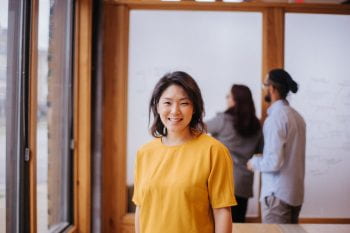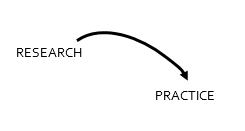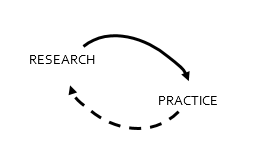
In the article below, guest writer Dr. Saras Chung highlights her work to create two-way bridges between researchers and practitioners who can co-design system-level strategies to enhance educational equity in St. Louis. Dr. Chung is Executive Director of SkipNV and a Faculty Affiliate for the Social System Design Lab at Washington University in St. Louis’ Brown School.
Imagine the world you want to see. In our work in education, we imagine this as a future where children and youth in St. Louis have access to inspiring educational opportunities no matter where they live, their household income, or their skin color. In order to achieve our moonshot dreams, we have put our bets on bridging the world of research to those who are doing the hard work everyday–educators, teachers, service professionals, and others. But we don’t stop there–we know that practitioners have a critical role to informing research–what are the questions that matter, the ideas that will make a difference? The “bridge” from research to practice is something we identified as being critical to our success.
However, we have quickly learned that the bridge between research and practice is in fact, not a bridge at all. The word “to” in the phrase “research to practice” is a preposition and implies direction–a one-way street. This unidirectional “bridge” could be better described as a radio: researchers define truth and then “disseminate” findings back to practice. There is no back and forth through a radio station–only a transmitter and a receiver. And as it is in real life, oftentimes the radio signal seems to be transmitted in some places better than others.

This phrase, research to practice, negates influential insights that are gained through hands-on experimentation, observation, modification, and learning that happens with the artful practice of everyday settings. Where’s the doubling back from practice to research? How fair is it to say that practitioners should use evidence-based practices when researchers aren’t often asked to incorporate practice-based wisdom into their findings?

In our work of striving for educational equity in St. Louis, this means finding avenues for researchers and practitioners to have open-ended two-way conversations. What does it mean to be impacted by the field of practice? It means we ask the field what questions they’d like to understand better and design research practices around that. As practitioners, it means that we seek to understand the research being conducted and ask questions about the limitations of how we can apply it. This two-way bridge requires each of us to consider the other of great worth and importance to the work of doing better for the people we serve in the community.
In the educational space, we are attempting to create these bidirectional bridges through the work of EdHubSTL–a place and space for all people interested in education (parents, teachers, administrators, students, and researchers) to share and learn from one another. Until we can figure out how to construct this bridge as a two-way path, we imagine the dreams we have for all children to have opportunities in education will be simply that–a dream and not reality.
Dr. Chung received a master of social work and PhD in social work from the Brown School and a bachelor of science in psychology from the University of Illinois at Urbana-Champaign. She holds over 15 years of practice working with children and youth in residential school settings and researching youth development and social and emotional learning initiatives.
Dr. Chung is a published researcher, writing and co-authoring peer-reviewed research in journals, such as the American Journal of Community Psychology and the Journal for Ethnic and Cultural Diversity in Social Work and is a member of the American Educational Research Association, Society for Social Work Research, and the System Dynamics Society. In addition to her work in education, Dr. Chung teaches courses on system dynamics at Washington University with the Social System Design Lab.